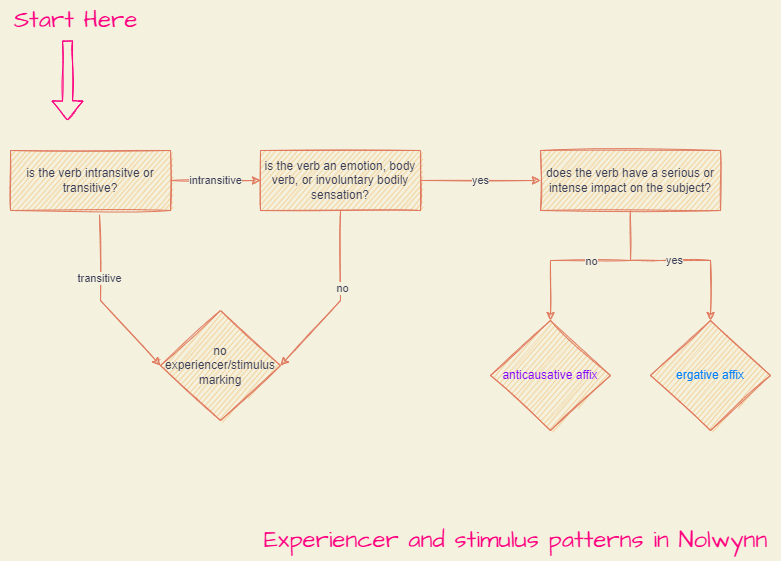Experiencer and stimulus
▲
0▲ 0 ▼ 0
emotions and feelings
This public article was written by [Deactivated User], and last updated on 7 Nov 2022, 17:08.
[comments] nlnnolwynnexperienceremotionsintransitive
5. 2021 CoWriMo
?
?
7. 2022 Goals
?
?
9. 2023 Goals
?
?
10. 2023 Lexember Roundup
?
?
11. 2024 Goals
?
?
13. Captative verbs
?
?
14. Collocations
?
?
15. Colors in Nolwynn
?
?
21. Culture: Food Rituals
?
?
23. Culture: Names
?
?
24. Culture: Parenting
?
?
25. Culture: Religion
?
?
26. Demonstratives
?
?
27. Discourse particles
?
?
28. Emotion signifiers
?
?
29. ergativity
?
?
31. font characters
?
?
33. Grammatical moods
?
?
37. Intransitive Verbs
?
?
39. Lesson #1: Verb basics
?
?
40. Lesson #2: Verbs again
?
?
41. Making comparisons
?
?
42. More about pronouns
?
?
47. Politeness and respect
?
?
53. Relative Clauses
?
?
55. Story mood
?
?
57. Telling time
?
?
58. Tulwyn vs Nolwynn
?
?
59. Untranslatable words
?
?
?FYI...
This article is a work in progress! Check back later in case any changes have occurred.
This article is a work in progress! Check back later in case any changes have occurred.
This article will dive into more detail on intransitive verbs, anticausatives, and unergatives, but won't provide detailed explanations as to what those terms mean. For more detailed explanations on those terms, see the article Intransitive Verbs .
experiencer: receives an emotional or sensory sensation
stimulus: prompts an emotional or sensory sensation
Experiencer and stimulus are grammatical forms that allow speakers to talk about involuntary bodily sensations or emotions. They are a remnant of similar forms found in
 Proto-Abyssal.
Proto-Abyssal. 
The assumptive, anticausative, unergative, and ergative cases can all be thought of as ways to mark an experiencer. As with all intransitive verbs, speakers need not mark the verb at all if they feel the ambiguity is semantically warranted: this is called the assumptive case [zero marking].
However, typically, when speaking about involuntary bodily sensations and experiences, the verb is marked with the anticausative form. There is flexibility here. If the speaker feels that the experience was intense or harmful, the verb might instead be marked with the ergative marker. For example:
kanáleeywo
sad<ANTC>.1S
I’m sad
The speaker isn’t placing any special emphasis on being sad, but the anticausative implies some kind of reaction. Perhaps the speaker's sadness is a normal reaction to something.
aleeyma
hear.1S
I hear something
Aleeyma "hear" is considered an ergative verb, and therefore it has an implied second argument. No special marking on the intransitive verb makes the phrase ambiguous but grammatically acceptable.
oriza aláleeyma
sound hear<ANTC>.1S
I hear a sound
[This verb is usually shortened to áleeyma for pronounceability's sake.] This phrase indicates that the speaker just happened to hear something and wasn’t actively listening for something. Since this phrase includes a direct object, the verb must be marked in some way.
kaneeywewo
sad<ERG>.1S
I’m sad
The use of the ergative marker indicates that this is something that impacts the speaker in a harsh, perhaps unexpected way.
oriza aleeywema
sound hear<ERG>.1S
I hear a sound
This phrasing implies that the speaker was actively listening for something.
In Nolwynn, the stimulus is usually not marked in a special way unless it was especially intense. In these cases, the stimulus is marked with an emotion signifier. The emotion signifier goes directly in front of whatever is causing the emotional reaction. Here is an example using kxa "said in anger."
kxa myo komáleeya!
anger onion hate<ANTC>.1S
I hate onions!
This one uses olwá :
olwá oriza aleeywema
sad sound hear<ERG>.1S
I hear a sound
A common one used for sickness is tú “said in fear.” When using this emotion signifier, the phrase will likely be subject to the Avoidance Language. In the following examples, remember that phrases describing sickness usually follow the pattern of noun + zalteey "do"
txapuuyá zalteey
headache do.1S
I have a headache
nabazšara zalteey
cancer do.1S
I have cancer
tú nabazšara zalteey
fear cancer do.1S
I have cancer
The special verb zalteey "do" is used in all of these sentences. Since the auxiliary verb zalteey is never marked for ergativity [see the article Ergativity for more information], the phrase would be assumed as a neutral statement [it is in the assumptive case]. This is fine in the first example: a headache is usually not serious. A speaker can instead convey seriousness by using an emotion signifier. But if the speaker wanted to emphasize the seriousness of the situation without using an emotion signifier, a different verb would be necessary.
There are a variety of ways to phrase being sick. One can use zalteey, as in the examples given above, or a possessive phrase using swo’eey “with, accompany” [this is especially common with sicknesses that are perceived as arising from the body itself], or using the verb kuzuréoeey “be sick.” If not using zalteey, it is possible to use the anticausative marker to emphasize the speaker's experience of being sick:
nabazšara swo’eey
cancer do.1S
I have cancer
[no special emphasis]
nabazšara kuzuráleey
cancer sick<ANTC>.1S
“I’m sick with cancer”
I have cancer
[It's impacting me greatly]
Notice that in this example, the verb kuzuréoeey loses its valency marker.
✎ Edit Article ✖ Delete Article
Comments






